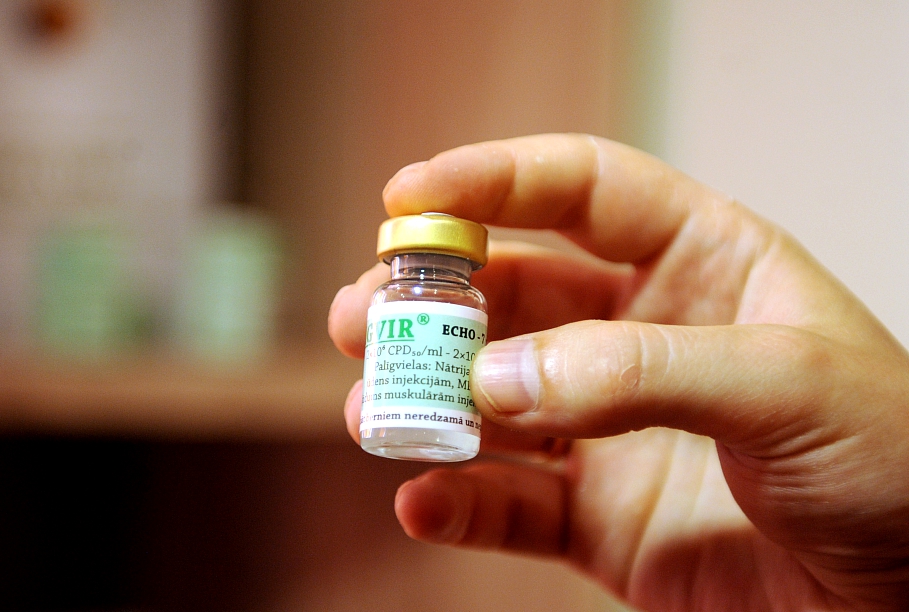The controversy surrounding the prescription of 'Rigvir', a Latvia-developed virotherapy treatment for melanoma is to be welcomed. Whispers and rumors about the efficacy of the treatment, about the characters of some of the individuals involved and about the considerable cost to the state of having Rigvir treatment on the list of reimbursable medicines have been circulating for a long time. This is a chance to flush them all out and resolve the whole matter. Indeed, not to do so would make things ten times worse.
The full controversy has been outlined in previous news stories, but boils down to this: advocates of Rigvir (most notably the closely-linked International Virotherapy Center in Riga) say it is a highly effective treatment not only for melanoma (for which it was licensed in 2004) but for a wide range of other cancers. They rely upon the original pre-licensing research plus anecdotal evidence to support this, with occasional hints that other secret commercially-sensitive evidence also exists (which the Health Ministry recently alluded to as well and which the State Medicines Agency confirms in the tweet below).
Zāļu Rigvir reģistrācijas lietā ir gan publiski, gan nepublicēti pētījumi. Nepublicēto pētījumu saturu @ZVALatvija nav tiesību atklāt pic.twitter.com/dGq5KwmScU
— Zāļu valsts aģentūra (@ZVALatvija) October 3, 2017
Rigvir's owners say that having developed the treatment themselves, they do not want to be swallowed up by multinational pharma companies but wish to oversee the medical and commercial application of their intellectual and pharmacological property. This is their right.
Opponents say Rigvir was approved for the treatment of melanoma only on the basis of clinical trials that might not meet modern standards and that there is no clinical evidence for Rigvir's effectiveness fighting other cancers. Some will go further and say the whole thing is little more than a scam offering quack cures to desperate patients in fear of their lives.
A representative sample of the respective positions is given in the Twitter conversation below between U.S. oncologist David Gorski and Rigvir representative Karlis Urbans (clicking on the first tweet should open up the full exchange).
False dichotomies: 1. If I haven’t used Rigvir, I can’t say it doesn’t work. 2. If I can’t say what does work, I can’t comment on Rigvir. 1/ https://t.co/eP54xB5Ag1
— David Gorski (@gorskon) October 2, 2017
These are the basic positions. There are other peripheral accusations flying in both directions involving potential conflicts of interest, unethical advertising and more, but I would like to concentrate on how to resolve the Rigvir question once and for all rather than dwell on those.
Clearly the key question is: does Rigvir work, and if so, on which cancers? Answering this question is actually quite simple, if expensive, and comes in just two words: clinical trials.
Rigvir's holding company points out that conducting clinical trials that would comply with US or EU regulations is a lengthy and expensive business (the existing license was granted a few days before Latvia joined the EU in 2004 and therefore is not applicable elsewhere). This is certainly true, but it is surely a matter of some urgency that such trials are conducted. Rigvir advocates say they cannot put treatment on hold as patients will die in the interim.
By the same logic, a far greater number of patients would die in the future if Rigvir treatment is unavailable to them. If the owners of Rigvir are genuinely opposed to selling out to big pharma for what should be many millions of dollars, preferring instead to treat a handful of patients at their own approved clinics in Mexico, Armenia and Georgia, one has to question both their commercial sense and their sense of moral obligation to provide the treatment to as many patients as possible, if not their confidence in their product.
So what is required is a means by which the clinical trials can be carried out, licenses for use in the EU (and preferably North America, China and other major markets) can be obtained, Rigvir can go global and thousands of cancer patients around the world can get life-saving treatment.
If Rigvir Holdings and the International Virotherapy Center lack the resources for this research, it could perhaps be channeled from other sources as a matter of national interest: the money currently spent by the government on prescribing Rigvir without EU approval might be a start. Investment bonds (perhaps issued via the Altum investment institution as with their recent green bond?) might be another. The European Union has in the past signalled willingness to provide funding for Rigvir research and commercialization. A wholesale sell-out of the company is not inevitable: presented with a credible prospectus, private investors would be lining up for a share of the long-term profits.
Imagine what a success it would be to have an internationally-licensed product, backed by Latvia, saving thousands of lives around the world every month. It would be a source of genuine national pride, it would win countless awards, generate wonderfully positive coverage, it would show Latvia being an innovator and a leader... and it would make a lot of people extremely rich.
Now, Rigvir's enemies will probably deride this idea, but I have something to mollify them, too. Support for credible, international-standard clinical trials would be subject to just two conditions: first, that Rigvir holdings and all associated commercial enterprises remain domiciled in Latvia until the expiration of Rigvir's commercial and intellectual rights. In this way, the money invested in the clinical trials would be recouped many times over via corporate and other taxes. The revenues generated might be channeled into the national Healthcare budget and the scientific Research and Development budget where it could support oncology and the development of new, even more effective cures for cancers.
The second condition is this: in the event that the clinical trials show Rigvir to be either a quack cure, or of less medical efficacy than suggested by the original medical data, all costs are paid by the owners of the commercial and intellectual rights to Rigvir, namely Rigvir holdings.
But having repeatedly stated their utter belief in the effectiveness of their product, and with glowing testimonials from patients, they would have nothing to fear. It is a simple case of putting your money where your mouth is, the sort of win-win, risk-free opportunity that any commercial development officer would jump at.
This might seem a strange analogy but I think is a valid one: we need only look at the banking sector to see what happens when such questions and rumors remain unresolved. It was not so long ago that Latvia's boutique banking sector was the next big thing. They were awash with cash, they were in some senses a source of national pride and the hand of the regulator lay lightly upon them, not wanting to cramp their entrepreneurial style. A few people pointing out that the sources of their cash were dubious, the business models unsustainable and the regulation lax were ignored or assumed to be jealous foreigners envious of this domestic success story.
Unfortunately they turned out to be right. Parex banka went bust, Krajbanka went bust, Trasta banka was shut down. Latvia's boutique banking sector was shown to be involved in the Magnitsky Russian money laundering case, a billion dollar Moldovan fraud, smuggling nuclear technology to North Korea and more. It had, in a sense, failed its clinical trial. Nearly a decade on the ''clean" banks and a much tougher regulator are still laboring under the reputational damage these quack banks caused, which might easily have been avoided by sticking to the latest "clinical guidelines" of the banking sector rather than merely appearing to do so.
If Rigvir is not a pharmacological Parex, it deserves to succeed in as spectacular a way as possible. If it is a pharmacological Parex it needs to be exposed not only to save patients but also to avoid contagion of the whole Latvian pharma and medical sector, including the Health Ministry itself.
With banks though, you are generally only talking about money and financial ruin, not human death (Magnitsky excepted). This prompts me to finish with a declaration of my own interest. Like many people reading this I have watched someone die of cancer. Unsurprisingly, it is not a pleasant sight. In this particular case, the patient was wildly misdiagnosed and for several months received an entirely inappropriate and medically useless course of treatment while the cancer spread.
During that time what should have been a treatable cancer with an optimistic prognosis became an obviously terminal case. It was tragic, but I hold no grudge against the doctor who got it wrong, convinced as I am that he was acting in good faith. As I said at the outset, it is unthinkable that a medical or even business professional would intentionally foist a bogus cure onto a cancer patient. At least, one would hope so.
































